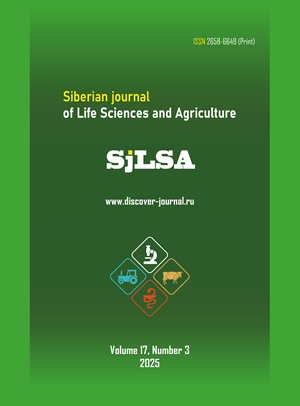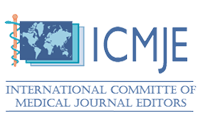Оценка биобезопасности природных штаммов Bacillus spp., обладающих ценными биотехнологическими свойствами
Аннотация
Обоснование. Современной тенденцией развития сельского хозяйства является его экологизация за счет использования микроорганизмов, обладающих комплексом полезных свойств (антагонистическая активность, продукция ферментов и пр.). Важным критерием отбора для включения микробов в состав биопрепаратов является их безопасность.
Цель. Настоящее исследование направлено на изучение безопасности природных штаммов Bacillus spp., обладающих ценными биотехнологическими свойствами.
Материалы и методы. Объектами исследования были 10 штаммов бацилл из коллекции Инжинирингового центра «Промбиотех» АлтГУ. Для штаммов определены: способность к продукции ферментов патогенности классическими микробиологическими методами (гемолитическая, фосфатазная, лецитиназная и рибонуклеазная активности), профиль генов синтеза энтеротоксинов и цереулидсинтетазы рвотного токсина (cytK, hblC, entFM, nheA, ces) с помощью тест-системы ПЦР-РВ, а также проведена оценка токсичности изучаемых штаммов бацилл на мышиной модели.
Результаты. Все изучаемые штаммы Bacillus spp. проявили как минимум одну энзиматическую активность (РНК-азную). Для видов B. pumilus, B. toyonensis и штамма B. licheniformis 6 выявили 3 положительных ферментативных теста из 4 (кроме лецитиназы). По данным ПЦР–РВ для всех исследуемых штаммов по пяти генам токсинов был получен отрицательный результат. Это подтвердилось в исследованиях in vivo, так как у подопытных мышей от действия супернатантов всех исследуемых штаммов Bacillus spp. не зафиксировали острый токсический эффект.
Заключение. Исследованные штаммы рода Bacillus не относятся к потенциальным возбудителям пищевых токсикоинфекций человека и животных, так как не продуцируют энтеротоксины и цереулид, а также не проявляют токсических свойств на мышиной модели.
EDN: DSUPHE
Скачивания
Литература
Бороздина, И.Б. (2011). Сравнительная характеристика бактерий рода Bacillus семейства Берёзовые (Betulacaea) при культивировании на искусственных питательных средах. Вестник Алтайского государственного аграрного университета, 2, 43-48. EDN: https://elibrary.ru/ncxvir
Сульдина, Е.В., Феоктистова, Н.А., Богданов, И.И. & Молофеева, Н.И. (2021). Выявление генов ферментов у бактерий вида Bacillus subtilis методом REALTIME PCR. Вестник Ульяновской государственной сельскохозяйственной академии, 4(56), 61-65. https://doi.org/10.18286/1816-4501-2021-4-61-65 EDN: https://elibrary.ru/rzcvqv
ГОСТ 33216-2014. Руководство по содержанию и уходу за лабораторными животными. Правила содержания и ухода за лабораторными грызунами и кроликами. М.: Стандартинформ, 2016. 17 с.
Журавлёв, П.В., Алешня, В.В. & Панасовец, О.П. (2018). Ферменты патогенности у бактерий, выделенных из воды открытых водоёмов. Здоровье населения и среда обитания, 1(298), 11-14. https://doi.org/10.35627/2219-5238/2018-298-1-11-14 EDN: https://elibrary.ru/ytzsrt
Иванова, А.Ю., Полосенко, О.В. & Шепелин, А.П. (2022). Разработка и оценка качества отечественной питательной среды для идентификации Bacillus cereus и Bacillus subtilis. Бактериология, 7(1), 18-24. https://doi.org/10.20953/2500-1027-2022-1-18-24 EDN: https://elibrary.ru/sxlbdp
Хайруллин, Р.М., Бурханова, Г.Ф., Сорокань, А.В., Сарварова, Е.Р., Веселова, С.В., Черепанова, Е.А., Вологин, С.Г., Замалиева, Ф.Ф. & Максимов, И.В. (2019). К механизмам антивирусной активности бактерий рода Bacillus subtilis на растениях картофеля. Теоретическая и прикладная экология, 4, 130-135. https://doi.org/10.25750/1995-4301-2019-4-130-135 EDN: https://elibrary.ru/bmhxvq
Маринин, Л.И., Дятлов, И.А. & Мокриевич, А.Н. (2021). Методы изучения биологических и молекулярно-генетических свойств возбудителя сибирской язвы. М.: Издательство «Династия», 240 с. ISBN: 978-5-98125-122-1 EDN: https://elibrary.ru/lbrswq
Набор олигодезоксирибонуклеотидных праймеров и флуоресцентно-меченых зондов для индикации цереулида и диарейных энтеротоксинов Bacillus cereus complex с помощью ПЦР-РВ. Патентная заявка № 2024121115.
Шеина, Н.И., Буданова, Е.В., Мялина, Л.И., Сазонова, Л.П. & Колесникова, В.В. (2018). Новые сведения о токсичности и опасности химических и биологических веществ. Микроорганизм Bacillus thuringiensis ssp. toumanoffi 25. Токсикологический вестник, 1, 135-137. https://doi.org/10.36946/0869-7922-2018-1-35-37 EDN: https://elibrary.ru/yrshqg
Байдалинов, А.И., Шемшура, О.Н., Исмаилова, Э.Т., Джакибаева, Г.Т., Тлеубекова, Д.А., Баймаханова, Г.Б. & Кенжеев, Ш.Т. (2022). Оценка биобезопасности штамма Bacillus amyloliquefaciens МВ40, перспективного в качестве основы биопрепарата против бактериального ожога плодовых культур. Микробиология және вирусология, 4(35), 38-47. https://doi.org/10.53729/MV-AS.2021.04.03 EDN: https://elibrary.ru/xdjpms
Ильинская, О.Н., Сокуренко, Ю.В., Ульянова, В.В., Вершинина, В.И., Зеленихин, П.В., Колпаков, А.И., Медведева, Е.С., Баранова, Н.Б., Давыдова, М.Н., Музыкантов, А.А. & Чернова, О.А., Чернов, В.М. (2014). Рибонуклеолитическая активность микоплазм. Микробиология, 83(3), 320-327. https://doi.org/10.7868/S0026365614030070 EDN: https://elibrary.ru/sbvwwf
Файрушин, Р.Н., Ганиева, Р.Ф. & Шарипов, А.Р. (2022). Оценка общей токсичности пробиотика Витафорт на лабораторных животных и его иммунного действия на организм телят. В: Сборник научных трудов двенадцатой международной межвузовской конференции по клинической ветеринарии в формате partners. Москва, 463-468. EDN: https://elibrary.ru/htfayl
Феоктистова, Н.А., Васильев, Д.А. & Климушкин, Е.И. (2015). Подбор перспективного производственного штамма Bacillus anthracis для конструирования фагового биопрепарата. Вестник Ульяновской государственной сельскохозяйственной академии, 3(31), 69-75. https://doi.org/10.18286/1816-4501-2015-3-69-75 EDN: https://elibrary.ru/umibbh
Шеина, Н.И. (2012). Критерии оценки биобезопасности микроорганизмов, используемых в биотехнологической промышленности. Вестник Оренбургского государственного университета, 6(142), 165-169. EDN: https://elibrary.ru/pdqwfn
Балабанова, Л.А., Сейткалиева, А.В., Сон, О.М. & Текутьева, Л.А. (2023). Щелочные фосфатазы: распространение в природе и биологические функции. Чебоксары: Среда, 144 с. https://doi.org/10.31483/a-10570 ISBN: 978-5-907688-94-0 EDN: https://elibrary.ru/cwswcz
Abdulateef, S.A., Owaif, H.A.A. & Hussein, M.H. (2023). Importance of Virulence Factors in Bacterial Pathogenicity: A Review. International Journal of Medical Science and Clinical Research Studies, 3, 765-769. https://doi.org/10.47191/ijmscrs/v3-i4-35 EDN: https://elibrary.ru/anbklb
Yoo, J.G., Chang, J.-H., Kim, S., Ji, J.-Y., Hong, S.-W. & Park, B.-Y., Oh, M.-H. (2014). Analysis of emetic toxin production by Bacillus species using cellular cytotoxicity, molecular, and chromatographic assays. Biotechnology and Bioprocess Engineering, 19, 978-983. https://doi.org/10.1007/s12257-014-0574-7 EDN: https://elibrary.ru/xbjteb
Animals in science. EU actions for the protection of animals used for scientific purposes. [Электронный ресурс]. URL: https://environment.ec.europa.eu/topics/chemicals/animals-science_en
Tuipulotu, D.E., Mathur, A., Ngo, C. & Man, S.M. (2021). Bacillus cereus: Epidemiology, Virulence Factors, and Host-Pathogen Interactions. Trends in Microbiology, 29, 458-471. https://doi.org/10.1016/j.tim.2020.09.003 EDN: https://elibrary.ru/azuevz
Baindara, P. & Aslam, B. (2023). Editorial: Bacillus spp. - Transmission, pathogenesis, host-pathogen interaction, prevention and treatment. Frontiers in Microbiology, 14. https://doi.org/10.3389/fmicb.2023.1307723 EDN: https://elibrary.ru/oxhdcx
Sheina, N.I., Budanova, E.V., Pivovarov, Y. & Sazonova, L. (2017). Biosafety Assessment of Microbial Strains Used in Biotechnology According to Their Taxonomy. International Journal of Biomedicine, 7, 51-56. https://doi.org/10.21103/Article7(1)_OA6 EDN: https://elibrary.ru/yginip
Liu, J., Fang, C., Jiang, Y. & Yan, R. (2009). Characterization of a Hemolysin Gene ytjA from Bacillus subtilis. Current Microbiology, 58(6), 642-647. https://doi.org/10.1007/s00284-009-9383-1 EDN: https://elibrary.ru/xwzkzn
Ehling-Schulz, M., Lereclus, D. & Koehler, T.M. (2019). The Bacillus cereus group: Bacillus species with pathogenic potential. Microbiology Spectrum, 7(3). https://doi.org/10.1128/microbiolspec.gpp3-0032-2018 EDN: https://elibrary.ru/kvmmgq
Abdulmawjood, A., Herrmann, J., Riede, S., Jimenez, G., Becker, A. & Breves, G. (2019). Evaluation of enterotoxin gene expression and enterotoxin production capacity of the probiotic strain Bacillus toyonensis BCT-7112T. PLoS One, 14, 1-15. https://doi.org/10.1371/journal.pone.0214536
Bamba, T., Aoki, R., Hori, Y., Ishikawa, S., Yoshida, K.I., Taoka, N., Kobayashi, S., Yasueda, H., Kondo, A. & Hasunuma, T. (2024). High-throughput evaluation of hemolytic activity through precise measurement of colony and hemolytic zone sizes of engineered Bacillus subtilis on blood agar. Biology Methods and Protocols, 9. https://doi.org/10.1093/biomethods/bpae044 EDN: https://elibrary.ru/wudxjv
Halder, D., Mandal, M., Chatterjee, S.S., Pal, N.K. & Mandal, S. (2017). Indigenous Probiotic Lactobacillus Isolates Presenting Antibiotic like Activity against Human Pathogenic Bacteria. Biomedicines, 5. https://doi.org/10.3390/biomedicines5020031
Kuban-Jankowska, A., Kostrzewa, T. & Gorska-Ponikowska, M. (2022). Bacterial Protein Tyrosine Phosphatases as Possible Targets for Antimicrobial Therapies in Response to Antibiotic Resistance. Antioxidants (Basel), 11(12). https://doi.org/10.3390/antiox11122397 EDN: https://elibrary.ru/pliksr
Rolny, I.S., Ivanna, S.R., Minnaard, J., Racedo, S.M. & Perez, P.F. (2014). Mouse model of gastrointestinal Bacillus cereus infection. Journal of Medical Microbiology, 63, 1741-1749. https://doi.org/10.1099/jmm.0.079939-0
Microbiological agents as notified to EFSA. [Электронный ресурс]. URL: https://zenodo.org/records/12793271
Caulier, S., Nannan, C., Gillis, A., Licciardi, F., Bragard, F. & Mahillon, J. (2019). Overview of the Antimicrobial Compounds Produced by Members of the Bacillus subtilis Group. Frontiers in Microbiology, 10. https://doi.org/10.3389/fmicb.2019.00302 EDN: https://elibrary.ru/zyggwt
Phelps, R.J. & McKillip, J.L. (2002). Enterotoxin Production in Natural Isolates of Bacillaceae outside the Bacillus cereus Group. Applied and Environmental Microbiology, 68(6), 3147-3151. https://doi.org/10.1128/AEM.68.6.3147-3151.2002
Roca, A., Cabeo, M., Enguidanos, C., Martínez-Checa, F., Sampedro, I. & Llamas, I. (2024). Potential of the quorum‐quenching and plant‐growth promoting halotolerant Bacillus toyonensis AA1EC1 as biocontrol agent. Microbial Biotechnology, 17. https://doi.org/10.1111/1751-7915.14420 EDN: https://elibrary.ru/nibfbm
Qualified presumption of safety (QPS). [Электронный ресурс]. URL: https://www.efsa.europa.eu/en/topics/topic/qualified-presumption-safety-qps
Kim, S.-H., Yehuala, G.A., Bang, W.Y., Yang, J., Jung, Y.H. & Park, M.-K. (2022). Safety Evaluation of Bacillus subtilis IDCC1101, Newly Isolated from Cheonggukjang, for Industrial Applications. Microorganisms, 10. https://doi.org/10.3390/microorganisms10122494 EDN: https://elibrary.ru/fsdvwb
Sharaf, E.F., El-Sayed, W.S. & Abosaif, R.M. (2018). Lecithinase-producing bacteria in commercial and home-made foods: Evaluation of toxic properties and identification of potent producers. Journal of Taibah University for Science, 8, 207-215. https://doi.org/10.1016/j.jtusci.2014.03.006
Soni, J., Sinha, S. & Pandey, R. (2024). Understanding bacterial pathogenicity: a closer look at the journey of harmful microbes. Frontiers in Microbiology, 15. https://doi.org/10.3389/fmicb.2024.1370818 EDN: https://elibrary.ru/rqmuxt
Jeżewska-Frąckowiak, J., Seroczyńska, K., Banaszczyk, J., Jedrzejczak, G., Żylicz-Stachula, A. & Skowron, P.M. (2018). The promises and risks of probiotic Bacillus species. Acta biochimica Polonica, 65, 509-519. https://doi.org/10.18388/abp.2018_2652 EDN: https://elibrary.ru/upxvcn
References
Borozdina, I. B. (2011). Comparative characteristics of Bacillus bacteria of the Betulaceae family when cultured on artificial nutrient media. Bulletin of the Altai State Agrarian University, 2, 43-48. EDN: https://elibrary.ru/ncxvir
Suldina, E. V., Feoktistova, N. A., Bogdanov, I. I., & Molofeeva, N. I. (2021). Detection of enzyme genes in Bacillus subtilis bacteria using REALTIME PCR. Bulletin of the Ulyanovsk State Agricultural Academy, 4(56), 61-65. https://doi.org/10.18286/1816-4501-2021-4-61-65 EDN: https://elibrary.ru/rzcvqv
GOST 33216-2014. Guidelines for the maintenance and care of laboratory animals. Rules for the maintenance and care of laboratory rodents and rabbits. Moscow: Standartinform, 2016, 17 p.
Zhuravlev, P. V., Aleshnya, V. V., & Panasovets, O. P. (2018). Pathogenic enzymes in bacteria isolated from open water bodies. Public Health and Habitat, 1(298), 11-14. https://doi.org/10.35627/2219-5238/2018-298-1-11-14 EDN: https://elibrary.ru/ytzsrt
Ivanova, A. Yu., Polosenko, O. V., & Shepelin, A. P. (2022). Development and quality assessment of domestic nutrient medium for identification of Bacillus cereus and Bacillus subtilis. Bacteriology, 7(1), 18-24. https://doi.org/10.20953/2500-1027-2022-1-18-24 EDN: https://elibrary.ru/sxlbdp
Khairullin, R. M., Burkhanova, G. F., Sorokan, A. V., Sarvarova, E. R., Veselova, S. V., Cherepanova, E. A., Vologin, S. G., Zamalieva, F. F., & Maksimov, I. V. (2019). On the mechanisms of antiviral activity of Bacillus subtilis bacteria in potato plants. Theoretical and Applied Ecology, 4, 130-135. https://doi.org/10.25750/1995-4301-2019-4-130-135 EDN: https://elibrary.ru/bmhxvq
Marinin, L. I., Dyatlov, I. A., & Mokrievich, A. N. (2021). Methods for studying biological and molecular genetic properties of anthrax pathogen. Moscow: Dynasty Publishing House, 240 p. ISBN: 978-5-98125-122-1 EDN: https://elibrary.ru/lbrswq
Set of oligodeoxyribonucleotide primers and fluorescently labeled probes for detection of cereulide and diarrheal enterotoxins of Bacillus cereus complex using RT-PCR. Patent application № 2024121115.
Sheina, N. I., Budanova, E. V., Mialina, L. I., Sazonova, L. P., & Kolesnikova, V. V. (2018). New information on toxicity and hazard of chemical and biological substances. Microorganism Bacillus thuringiensis ssp. toumanoffi 25. Toxicological Bulletin, 1, 135-137. https://doi.org/10.36946/0869-7922-2018-1-35-37 EDN: https://elibrary.ru/yrshqg
Baidalinov, A. I., Shemshura, O. N., Ismailova, E. T., Dzhakibaeva, G. T., Tleubekova, D. A., Baimakhanova, G. B., & Kenzheev, Sh. T. (2022). Assessment of biosafety of Bacillus amyloliquefaciens MB40 strain, promising as a basis for biopreparation against bacterial burn of fruit crops. Microbiology and Virology, 4(35), 38-47. https://doi.org/10.53729/MV-AS.2021.04.03 EDN: https://elibrary.ru/xdjpms
Ilinskaya, O. N., Sokurenko, Yu. V., Ulyanova, V. V., Vershinina, V. I., Zelenikhin, P. V., Kolpakov, A. I., Medvedeva, E. S., Baranova, N. B., Davydova, M. N., Muzykantov, A. A., Chernova, O. A., & Chernov, V. M. (2014). Ribonucleolytic activity of mycoplasmas. Microbiology, 83(3), 320-327. https://doi.org/10.7868/S0026365614030070 EDN: https://elibrary.ru/sbvwwf
Fairushin, R. N., Ganieva, R. F., & Sharipov, A. R. (2022). Assessment of general toxicity of Vitafort probiotic on laboratory animals and its immune effect on calves’ organism. In: Collection of scientific works of the Twelfth International Interuniversity Conference on Clinical Veterinary Medicine in partners format. Moscow, 463-468. EDN: https://elibrary.ru/htfayl
Feoktistova, N. A., Vasiliev, D. A., & Klimushkin, E. I. (2015). Selection of promising industrial strain of Bacillus anthracis for designing phage biopreparation. Bulletin of Ulyanovsk State Agricultural Academy, 3(31), 69-75. https://doi.org/10.18286/1816-4501-2015-3-69-75 EDN: https://elibrary.ru/umibbh
Sheina, N. I. (2012). Criteria for assessing biosafety of microorganisms used in biotechnological industry. Bulletin of Orenburg State University, 6(142), 165-169. EDN: https://elibrary.ru/pdqwfn
Balabanova, L. A., Seitkalieva, A. V., Son, O. M., & Tekutieva, L. A. (2023). Alkaline phosphatases: distribution in nature and biological functions. Cheboksary: Sreda, 144 p. https://doi.org/10.31483/a-10570 ISBN: 978-5-907688-94-0 EDN: https://elibrary.ru/cwswcz
Abdulateef, S.A., Owaif, H.A.A. & Hussein, M.H. (2023). Importance of Virulence Factors in Bacterial Pathogenicity: A Review. International Journal of Medical Science and Clinical Research Studies, 3, 765-769. https://doi.org/10.47191/ijmscrs/v3-i4-35 EDN: https://elibrary.ru/anbklb
Yoo, J.G., Chang, J.-H., Kim, S., Ji, J.-Y., Hong, S.-W. & Park, B.-Y., Oh, M.-H. (2014). Analysis of emetic toxin production by Bacillus species using cellular cytotoxicity, molecular, and chromatographic assays. Biotechnology and Bioprocess Engineering, 19, 978-983. https://doi.org/10.1007/s12257-014-0574-7 EDN: https://elibrary.ru/xbjteb
Animals in science. EU actions for the protection of animals used for scientific purposes. URL: https://environment.ec.europa.eu/topics/chemicals/animals-science_en
Tuipulotu, D.E., Mathur, A., Ngo, C. & Man, S.M. (2021). Bacillus cereus: Epidemiology, Virulence Factors, and Host-Pathogen Interactions. Trends in Microbiology, 29, 458-471. https://doi.org/10.1016/j.tim.2020.09.003 EDN: https://elibrary.ru/azuevz
Baindara, P. & Aslam, B. (2023). Editorial: Bacillus spp. - Transmission, pathogenesis, host-pathogen interaction, prevention and treatment. Frontiers in Microbiology, 14. https://doi.org/10.3389/fmicb.2023.1307723 EDN: https://elibrary.ru/oxhdcx
Sheina, N.I., Budanova, E.V., Pivovarov, Y. & Sazonova, L. (2017). Biosafety Assessment of Microbial Strains Used in Biotechnology According to Their Taxonomy. International Journal of Biomedicine, 7, 51-56. https://doi.org/10.21103/Article7(1)_OA6 EDN: https://elibrary.ru/yginip
Liu, J., Fang, C., Jiang, Y. & Yan, R. (2009). Characterization of a Hemolysin Gene ytjA from Bacillus subtilis. Current Microbiology, 58(6), 642-647. https://doi.org/10.1007/s00284-009-9383-1 EDN: https://elibrary.ru/xwzkzn
Ehling-Schulz, M., Lereclus, D. & Koehler, T.M. (2019). The Bacillus cereus group: Bacillus species with pathogenic potential. Microbiology Spectrum, 7(3). https://doi.org/10.1128/microbiolspec.gpp3-0032-2018 EDN: https://elibrary.ru/kvmmgq
Abdulmawjood, A., Herrmann, J., Riede, S., Jimenez, G., Becker, A. & Breves, G. (2019). Evaluation of enterotoxin gene expression and enterotoxin production capacity of the probiotic strain Bacillus toyonensis BCT-7112T. PLoS One, 14, 1-15. https://doi.org/10.1371/journal.pone.0214536
Bamba, T., Aoki, R., Hori, Y., Ishikawa, S., Yoshida, K.I., Taoka, N., Kobayashi, S., Yasueda, H., Kondo, A. & Hasunuma, T. (2024). High-throughput evaluation of hemolytic activity through precise measurement of colony and hemolytic zone sizes of engineered Bacillus subtilis on blood agar. Biology Methods and Protocols, 9. https://doi.org/10.1093/biomethods/bpae044 EDN: https://elibrary.ru/wudxjv
Halder, D., Mandal, M., Chatterjee, S.S., Pal, N.K. & Mandal, S. (2017). Indigenous Probiotic Lactobacillus Isolates Presenting Antibiotic like Activity against Human Pathogenic Bacteria. Biomedicines, 5. https://doi.org/10.3390/biomedicines5020031
Kuban-Jankowska, A., Kostrzewa, T. & Gorska-Ponikowska, M. (2022). Bacterial Protein Tyrosine Phosphatases as Possible Targets for Antimicrobial Therapies in Response to Antibiotic Resistance. Antioxidants (Basel), 11(12). https://doi.org/10.3390/antiox11122397 EDN: https://elibrary.ru/pliksr
Rolny, I.S., Ivanna, S.R., Minnaard, J., Racedo, S.M. & Perez, P.F. (2014). Mouse model of gastrointestinal Bacillus cereus infection. Journal of Medical Microbiology, 63, 1741-1749. https://doi.org/10.1099/jmm.0.079939-0
Microbiological agents as notified to EFSA. URL: https://zenodo.org/records/12793271
Caulier, S., Nannan, C., Gillis, A., Licciardi, F., Bragard, F. & Mahillon, J. (2019). Overview of the Antimicrobial Compounds Produced by Members of the Bacillus subtilis Group. Frontiers in Microbiology, 10. https://doi.org/10.3389/fmicb.2019.00302 EDN: https://elibrary.ru/zyggwt
Phelps, R.J. & McKillip, J.L. (2002). Enterotoxin Production in Natural Isolates of Bacillaceae outside the Bacillus cereus Group. Applied and Environmental Microbiology, 68(6), 3147-3151. https://doi.org/10.1128/AEM.68.6.3147-3151.2002
Roca, A., Cabeo, M., Enguidanos, C., Martínez-Checa, F., Sampedro, I. & Llamas, I. (2024). Potential of the quorum‐quenching and plant‐growth promoting halotolerant Bacillus toyonensis AA1EC1 as biocontrol agent. Microbial Biotechnology, 17. https://doi.org/10.1111/1751-7915.14420 EDN: https://elibrary.ru/nibfbm
Qualified presumption of safety (QPS). URL: https://www.efsa.europa.eu/en/topics/topic/qualified-presumption-safety-qps
Kim, S.-H., Yehuala, G.A., Bang, W.Y., Yang, J., Jung, Y.H. & Park, M.-K. (2022). Safety Evaluation of Bacillus subtilis IDCC1101, Newly Isolated from Cheonggukjang, for Industrial Applications. Microorganisms, 10. https://doi.org/10.3390/microorganisms10122494 EDN: https://elibrary.ru/fsdvwb
Sharaf, E.F., El-Sayed, W.S. & Abosaif, R.M. (2018). Lecithinase-producing bacteria in commercial and home-made foods: Evaluation of toxic properties and identification of potent producers. Journal of Taibah University for Science, 8, 207-215. https://doi.org/10.1016/j.jtusci.2014.03.006
Soni, J., Sinha, S. & Pandey, R. (2024). Understanding bacterial pathogenicity: a closer look at the journey of harmful microbes. Frontiers in Microbiology, 15. https://doi.org/10.3389/fmicb.2024.1370818 EDN: https://elibrary.ru/rqmuxt
Jeżewska-Frąckowiak, J., Seroczyńska, K., Banaszczyk, J., Jedrzejczak, G., Żylicz-Stachula, A. & Skowron, P.M. (2018). The promises and risks of probiotic Bacillus species. Acta biochimica Polonica, 65, 509-519. https://doi.org/10.18388/abp.2018_2652 EDN: https://elibrary.ru/upxvcn
Copyright (c) 2025 Alena N. Irkitova, Dina E. Dudnik, Angelina V. Malkova, Kseniya V. Khlopova

Это произведение доступно по лицензии Creative Commons «Attribution-NonCommercial-NoDerivatives» («Атрибуция — Некоммерческое использование — Без производных произведений») 4.0 Всемирная.






















































